Fox News Flash top headlines for Oct. 5
Fox News Flash top headlines for Oct. 5 are here. Check out what's clicking on Foxnews.com
At least 94 people have been killed and nearly 4,000 wounded as tens of thousands of protesters have taken to the streets in Baghdad and southern Iraq over the past five days, according to the Iraqi High Commission for Human Rights.
Security forces fired live ammunition and tear gas at demonstrators in Baghdad on Saturday, killing at least eight people and wounding 17, health and security officials said.
The protesters are taking a stand against a lack of jobs, corruption and poor public services. Living conditions were impacted by the war against the Islamic State, which took control of large parts of the country in 2014.
AT LEAST 31 DEAD IN IRAQ AS ANTI-GOVERNMENT PROTESTS GRIP COUNTRY
Iraq has the fourth-largest oil reserve in the world, but 22.5 percent of the population people makes less than $1.90 a day, according to the BBC.
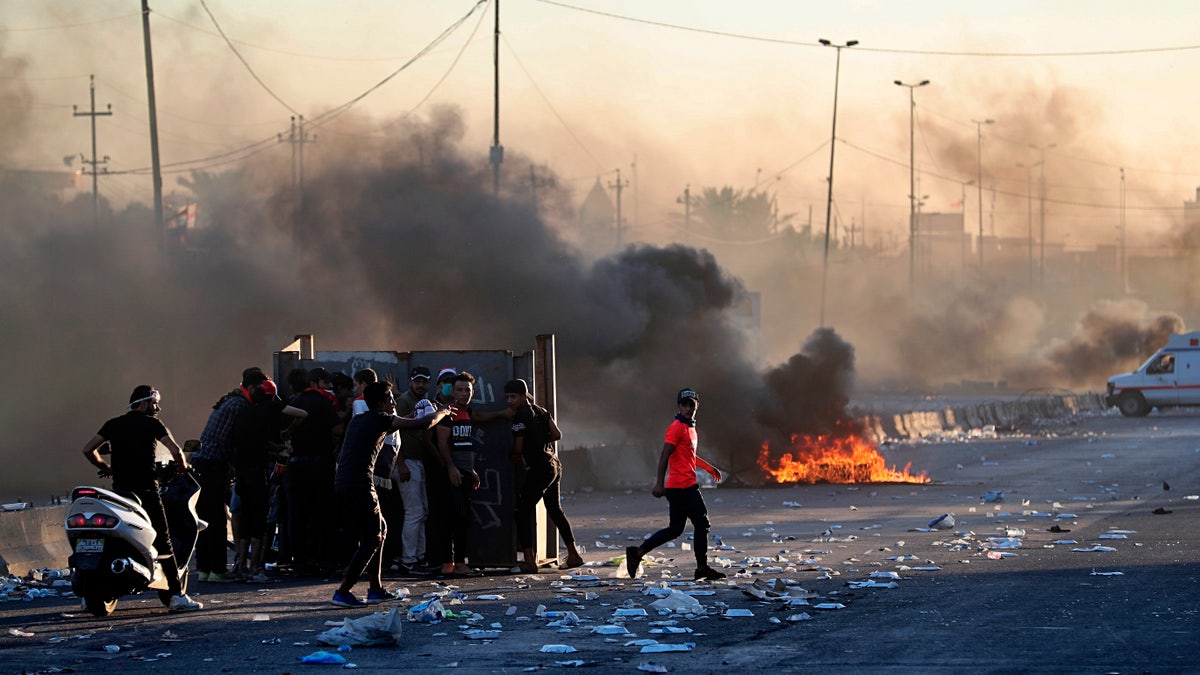
Anti-government protesters set fires and close a street during a demonstration in central Baghdad on Friday. Security forces opened fire, killing some protesters and injuring dozens, hours after Iraq's top Shiite cleric warned both sides to end four days of violence "before it's too late." (AP Photo/Khalid Mohammed)
The unemployment rate for people15-24 years old was 17 percent last year, according to the outlet.
Political unrest is arguably the toughest challenge for Iraq since the defeat of ISIS two years ago, and the first major challenge for Prime Minister Adil Abdul-Mahdi.
Authorities in Iraq have tried to control the demonstrators by setting curfews and implementing a near-total internet blackout to limit communications.
Protesters, however, haven't abided by the round-the-clock curfew, which was lifted Saturday.
Throughout the demonstrations, 540 protesters have been arrested and almost 200 remain in custody, according to the BBC.
An emergency meeting of parliament was scheduled for Saturday, although Al Jazeera's Imran Khan says it failed to take place after a number of key politicians didn't show up.
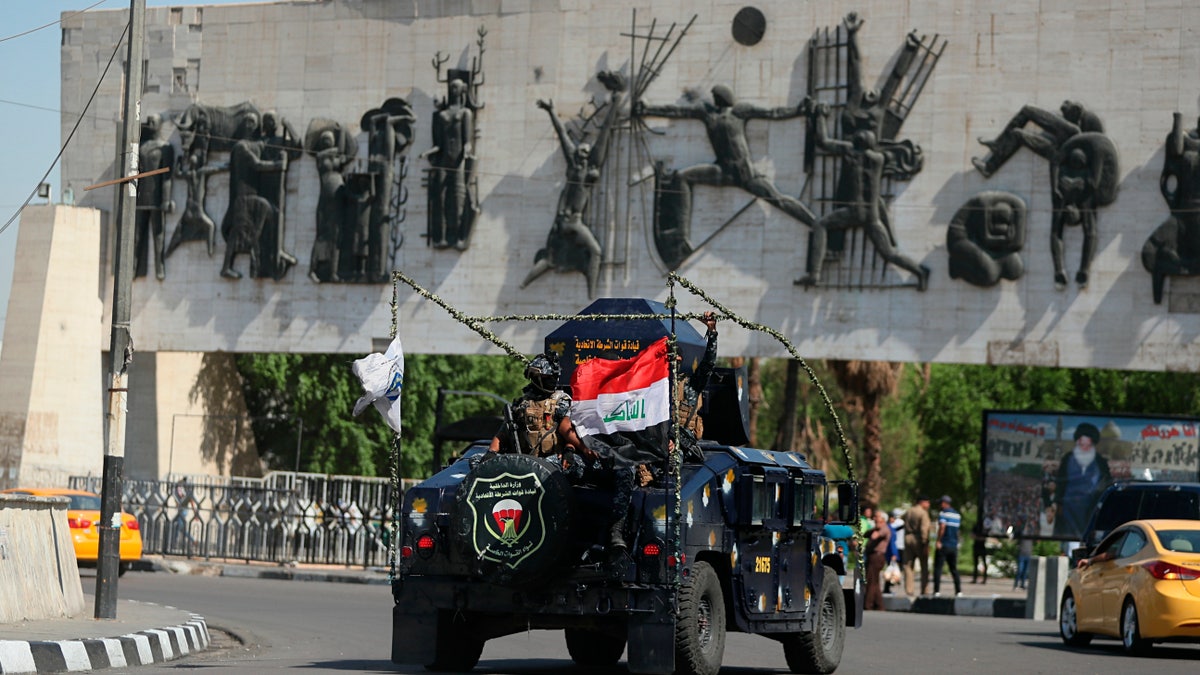
Iraqi security forces arrive near the site of the protests in Tahrir Square in central Baghdad on Saturday. Curfew has been lifted in the capital, days after authorities imposed it in an attempt to quell anti-government demonstrations that have turned deadly. Officials say at least 64 were killed in the four-day protests that have rocked the capital and southern cities. (AP Photo/Hadi Mizban)
"Three major blocs decided they were going to boycott that session because they said the government didn’t have an agenda it could implement; so, therefore, it was not worth going to the meeting," Khan said.
"There is a political crisis now brewing," he added.
Security was heavy throughout the capital but protests in central Baghdad were limited to a couple of streets near Tahrir Square.
9 DEAD, HUNDREDS WOUNDED IN TWO DAYS OF ANTIGOVERNMENT PROTESTS IN IRAQ
Health and security officials said four people were killed when forces fired at protesters gathered in a street near the square. The tear gas and live ammunition was so intense that hundreds of protesters retreated. In their new location, at least three more protesters were killed amid intense gunfire.
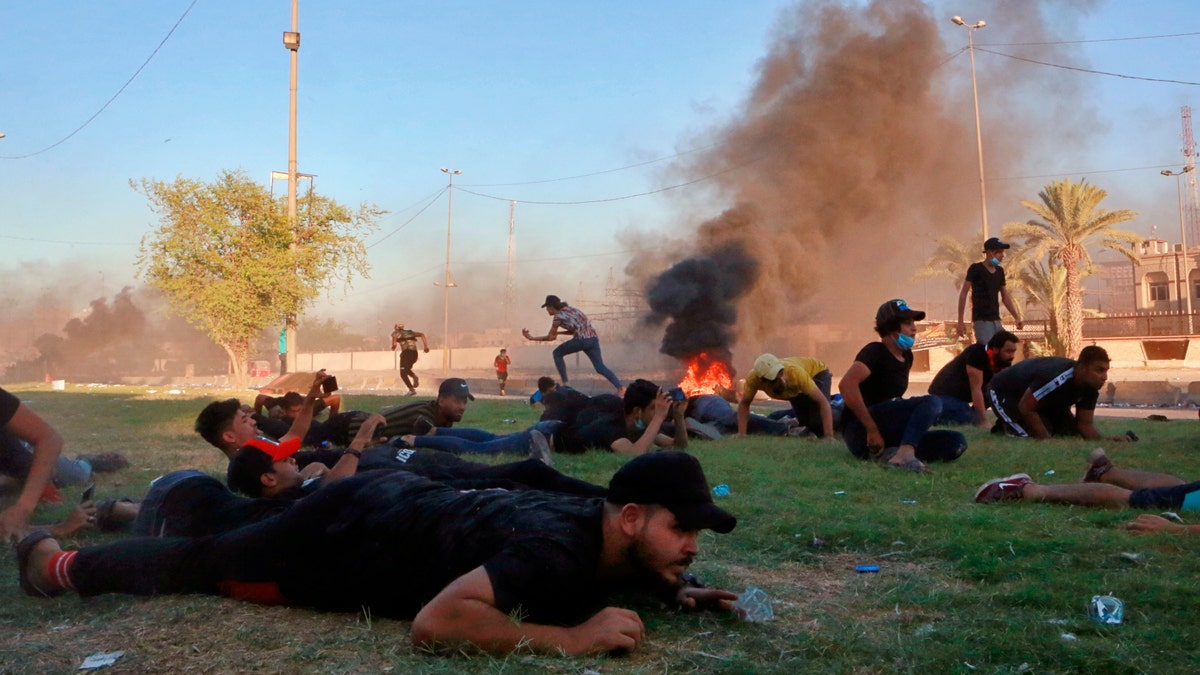
Anti-government protesters take cover while Iraq security forces fire during a demonstration in Baghdad, Iraq, Friday, Oct. 4, 2019. Security forces opened fire directly at hundreds of anti-government demonstrators in central Baghdad, killing several protesters and injuring dozens, hours after Iraq's top Shiite cleric warned both sides to end four days of violence "before it's too late." (AP Photo/Khalid Mohammed)
Four others were wounded, according to officials who spoke on condition of anonymity because they were not authorized to brief reporters. The area was the sight of Friday's deadly violence.
To the south, in the Zaafaraniyeh neighborhood, another protester was killed and 13 were injured, according to health and police officials.
Rasoul Saray, a 34-year-old unemployed Baghdad resident who took part in the protests, said security officials at checkpoints were stopping young men and turning them away in a number of suburbs, apparently fearing they would join the protests. Saray said he saw one young man get arrested after security officials inspected his mobile phone and found a recorded protest video.
The protests continued despite calls from Iraq's top Shiite cleric for both sides to end the violence "before it's too late."
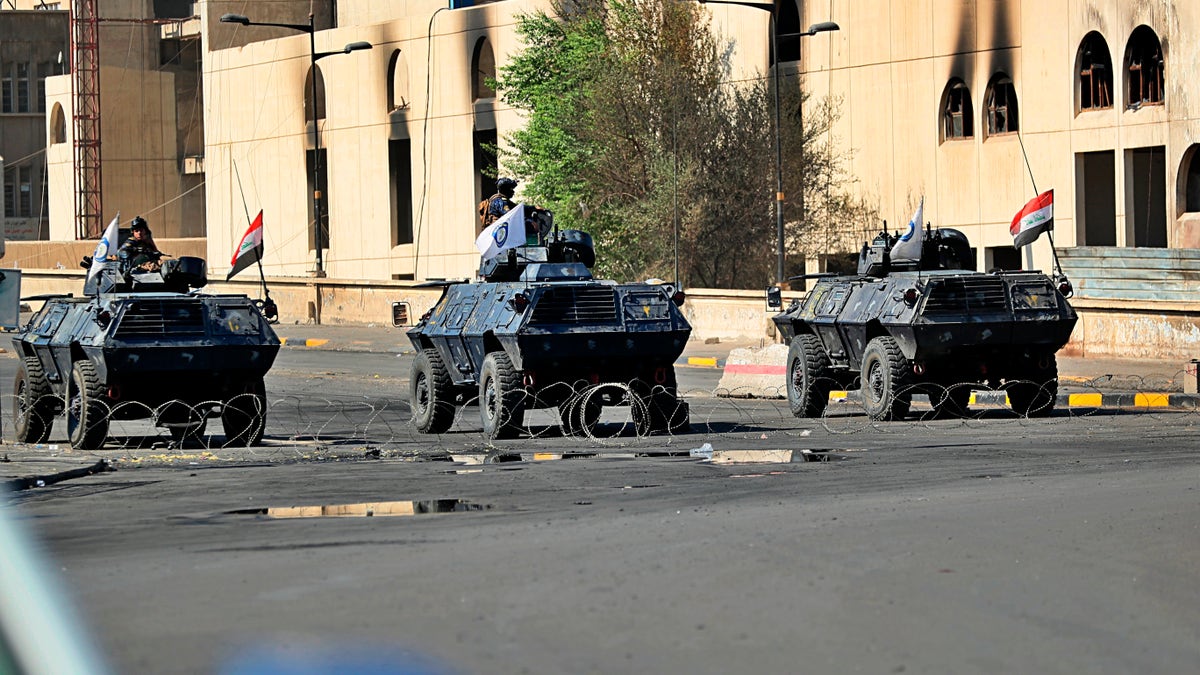
Iraqi security forces close a bridge road near the site of the protests in Tahrir Square in central Baghdad on Saturday. Curfew was lifted Saturday, days after authorities imposed it in an attempt to quell anti-government demonstrations that have turned deadly. (AP Photo/Hadi Mizban)
Iraqi politicians have scrambled to contain the protests, calling for meetings with protest leaders and arranging for a parliament meeting to discuss their demands.
JOEL ROSENBERG: US AND SAUDI ARABIA MUST STAND TOGETHER AGAINST IRAN
The spontaneous rallies started as mostly young demonstrators took to the streets demanding jobs, improved services including electricity and water, and an end to corruption.
"We will keep going and we won't back down," said Abbas Najm, a 43-year-old unemployed engineer, who was part of an earlier rally Saturday in Tahrir Square demanding an investigation into the killing of protesters. "It has been 16 years of corruption and injustice. We are not afraid of bullets or the death of martyrs."
Protesters gathered in Tahrir Square earlier Saturday raised banners demanding the resignation of Abdul-Mahdi and an investigation into the killings of protesters. One read: "Adel Abdul-Mahdi must resign immediately."
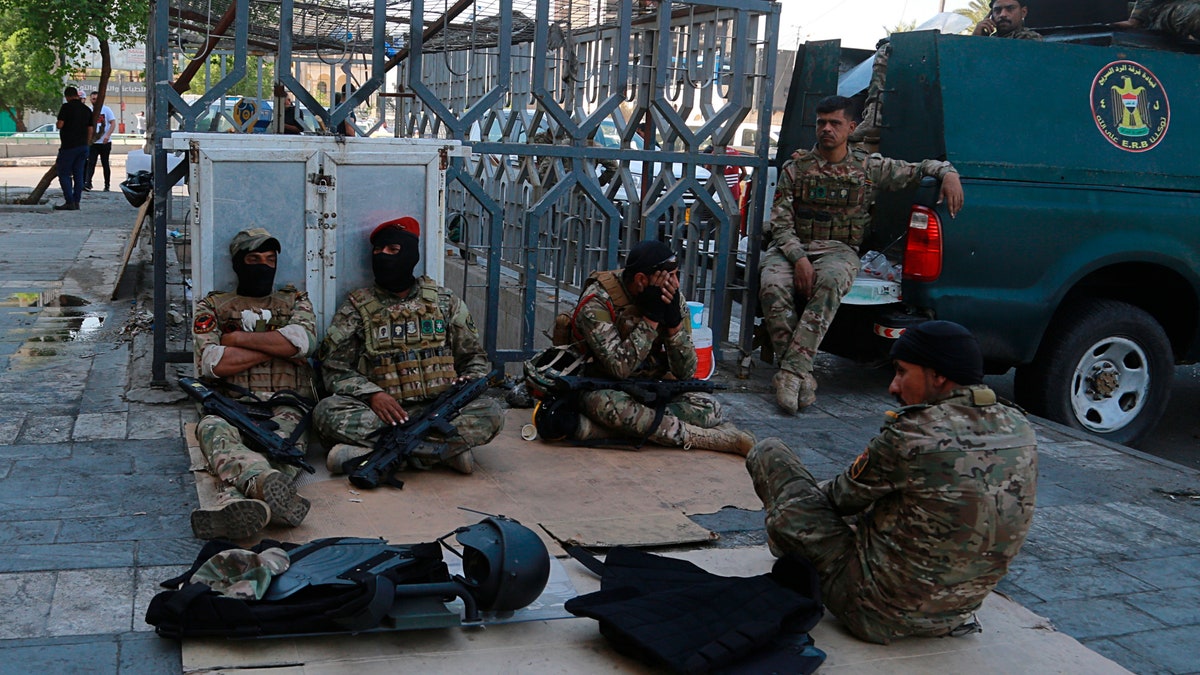
Iraqi riot police deploy Saturday near the site of the protests in Tahrir Square in Baghdad. (AP Photo/Hadi Mizban)
Even after lifting the curfew, security remained heavy in Baghdad, and access to the Green Zone, the area housing government offices and foreign embassies, was restricted.
A curfew remained in place in other cities in the south, where violence has been deadly in the last four days and authorities were concerned more rallies would be organized.
On Friday, influential Shiite cleric Muqtada al-Sadr called on Abdul-Mahdi's government to resign and hold early elections, saying the shedding of the blood of Iraqis "cannot be ignored." Al-Sadr, who controls the largest bloc in parliament, called on members of his coalition to boycott sessions until the government puts forth a program acceptable to the people.
Both Abdul-Mahdi's office and Parliament Speaker Mohammed al-Halbusi called for a meeting with protest representatives.
CLICK HERE TO GET THE FOX NEWS APP
In a desperate attempt to curb the growing unrest, authorities blocked the internet and imposed the curfew.
CLICK HERE FOR THE ALL-NEW FOXBUSINESS.COM
Abdul-Mahdi said in an address to the nation that the protesters' "legitimate demands" had been heard, but security measures aimed at controlling the demonstrations are necessary "bitter medicine."
The Associated Press contributed to this report.

